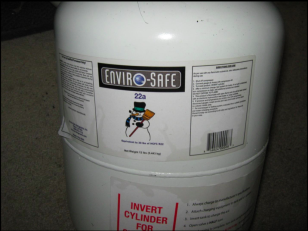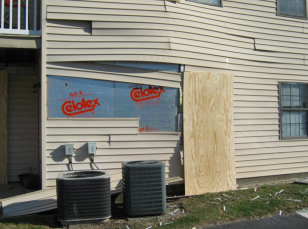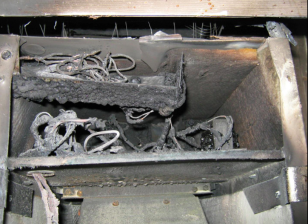Thinking Of Recharging Your AC Unit? Here’s What You Absolutely Need To Know About Replacement Refrigerants
Someday soon(ish), it’ll be warm again in most parts of the country, and you might be thinking of giving your home or car air-conditioning a bit of a boost to prepare for the summer heat. Whether you’re working with an HVAC technician or doing it yourself, it matters what you’re using to recharge that AC unit, and some refrigerants are better left unused.
It might sound like a no-brainer to avoid putting propane in an air-conditioner, but there are illegal refrigerants on the market that contain contain this flammable ingredient. Making matters more confusing: the name of this illegal refrigerant has a name that’s awfully similar to one that you can use in your AC unit.
R-22 (or HCFC-22) is the name for a gas used in air-conditioners. It’s being phased out because of its ability to deplete the ozone layer, but it’s legal to use when recharging your AC.
Then there’s R-22a, which can “catch fire or explode, resulting in injury and property damage” when used in air-conditioning systems that aren’t designed for propane, the EPA warns.
There are some bad actors out there peddling R22-a as a substitue for R-22. Folks could perhaps be confused into thinking that R-22a is some kind of next level R-22, which will no longer be produced in the U.S. starting Jan. 1, 2020. However, it’s most definitely not on the list of acceptable substitutes for R-22.
The EPA recently issued a renewed warning to consumers and HVAC technicians alike of the dangers of using the prohibited refrigerant in case they come in contact with R-22a and mistake it for the legal substance.
“We want to remind folks that using the wrong refrigerants can result in serious consequences, such as injuries and property damage,” Luke Hall-Jordan, the acting chief of the EPA’s Stratospheric Program Implementation branch told Consumerist. “That’s something we’re concerned about.”
While the EPA recommends that people consult with a qualified contractor or technician who knows how to safely handle refrigerants and flammable substances in general, consumers should be aware of the chemical because of the danger it could pose. Using it in your systems could void the AC unit’s warranty as well.
Along with warning people away from the product ahead of the summer season, EPA is making moves to crack down on the illegal R-22a industry first, by going after companies or individuals selling it. While the agency won’t comment on any ongoing actions it’s taking, it notes that it’s settled with several companies over allegations regarding the sale of R-22a as a refrigerant.
The agency has also proposed a rule that would list refrigerant products sold as R-22a and any identified as flammable as “unacceptable for retrofitting residential and light commercial AC and heat pumps—unitary split AC systems and heat pumps—that is, for use with existing central air conditioning systems.”
R-22a, which has been a target of EPA warnings and investigations for the last half-decade, is just the latest problematic copycat HVAC refrigerant on the scene. Back in the mid 1990s, Hall-Jordan tells Consumerist, when the EPA started phasing out HCFCs’ predecessor, CFCs, officials started seeing a product called 12a, or R-12a, which mimicked CFC 12/R-12.
Officials took similar actions to those they’re taking today, adding it to the list of prohibited refrigerants and warning consumers away from it. Generally, Hall-Jordan says, that process worked.
“Having some clarity on what’s allowed and what’s not allowed has been helpful in making it clear to industry and the public that these are not safe alternatives,” he tells Consumerist.
Now that we’re clear on R-22a — do not use it! — what should you do if you realize you’ve accidentally purchased it, or that your HVAC technician put it into your home/car unit?
Contact your local or state environmental agency right off the bat, Hall-Jordan recommends, and report it to the EPA at www.epa.gov/tips.
“We definitely encourage folks — if you see something, let us know,” Hall-Jordan says.
Our esteemed colleagues down the hall at Consumer Reports recommend that owners of central air-conditioning systems have them serviced by a pro at least once a year.
To find one in your area, check the website of the ACCA, a trade organization. Ask the technician to change all filters, clean and flush the coils, drain the pan and drainage system, and vacuum the blower compartments. The contractor should also check that the system is properly charged with refrigerant, that there are no leaks, and that all mechanical components are working properly.
Want more consumer news? Visit our parent organization, Consumer Reports, for the latest on scams, recalls, and other consumer issues.




